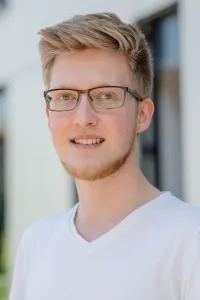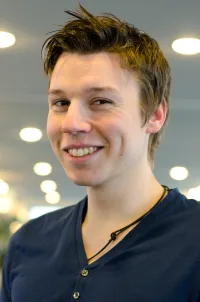
Nick Trapp is a second-year student of Chemistry. He is pursuing the Bachelor of Science degree, 1-subject programme.
What made you choose this degree programme?
In chemistry lessons at school, the question “Why are things the way they are?” is usually only superficially touched upon. That was never good enough for me. I wanted a satisfying answer to this question. And so you can say, it was my interest in this question that led me to chemistry. At the same time, I recognised that the diverse specialisation options provided by the chemistry degree would give me enough time to settle for a professional career after graduation.
In which respect have or haven’t your expectations been fulfilled?
I didn’t really have any great expectations. But I did hope to find questions to the “Why?”, to meet many people and to make new friends. For me, it was also important to gain knowledge that I could use to make the world a slightly better place. The lectures have indeed provided many answers to the “Why?” already, even though I’m only in my fourth semester. You do get to meet many people; with fewer than 200 students, the degree course is smaller than degree programmes such as law – that makes it easy to navigate and makes you feel at home at the faculty. Sooner or later, you’ll get to meet everyone.
Which aspect of your degree programme do you enjoy most?
Studying truly scientific and fundamental matters that affect everybody’s lives. The lightbulb moments are something very special: when you realise that what you have just learned is being implemented even now in large enterprises such as Bayer or Evonik or on a million-ton scale somewhere in the world. The internships, all of which are completed at the faculty, are huge fun, as you get to apply what you’ve learned in the lectures and get to synthesise substances.
What has been your biggest challenge to date?
By the 3rd semester, my motivation had dwindled, as it is not at all easy to find your perfect study and revision pace. Due to the many modules and lectures in each semester, excellent time management is vital. Without it, you soon won’t be able to follow the lectures anymore. The 4th semester is the most time-consuming one so far; but even though there is more to do than it is possible to handle, it is also a lot of fun again. For me, this is because of the internship in organic chemistry
What would you like to become after completing your degree?
After completing my Master’s and PhD degrees, I’d like to work in executive positions in the industry, working my way from lab manager, through department head, to manager at a large chemical company. I’d like to find applications for what I’ve learned and found out through research that are really useful. At a later stage, I can also imagine returning to university as a professor in order to share my knowledge with the new generation of chemists
Which advice would you like to give to students who consider enrolling in this degree programme?
You mustn’t underestimate the workload and the requirements you will face in your degree course. Teamwork, good time management, considerable motivation, and continuous revisions are key. Even though you’ll soon find you have no leisure time, you will still feel like you didn’t get anything done. Join a study group and revise the material covered in the lectures, starting in the very first week. Help each other. Bulimic learning is not cool! Draw up a revision timetable. You study in a different way for each subject. But make sure to have enough downtime and draw clear lines – it’s always possible to study even more. Anyone who is doing an internship after two years at university and only feels like complaining about it should question their motivation for studying this subject. Talk to students in higher semesters, who have already experienced what is still ahead of you. And never lose sight of the fact that you’ve invested a lot of time into this degree course: make sure you have fun with it.




